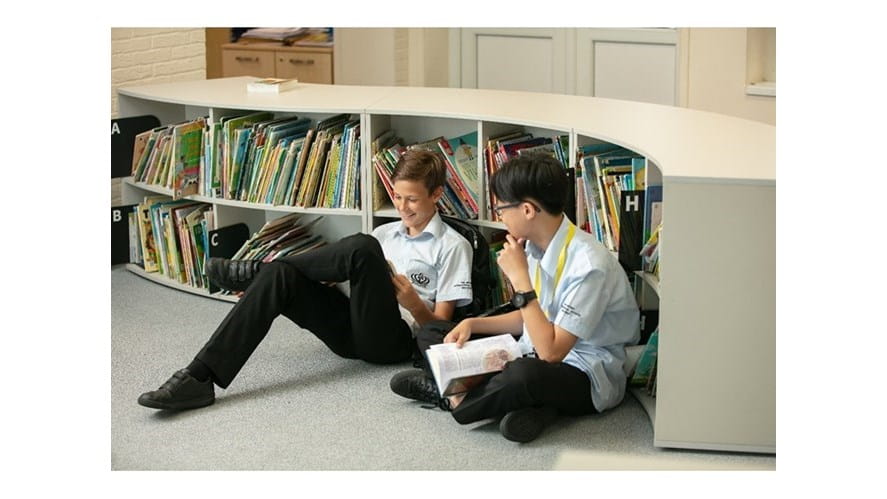We use cookies to improve your online experiences. To learn more and choose your cookies options, please refer to our cookie policy.

Your child's reading skills are important to their growth as a person. Not only does reading give them greater access to the breadth of their school curriculum, but it also improves how they interact with other people and the wider world around them. It’s also a fun and imaginative activity for your children, which opens doors to all kinds of new worlds for them.

The benefits of reading touch numerous aspects of your child’s life, making it an important area to explore as soon as you can. Here, we’ll reinforce the proven benefits of reading for your child and posit a few suggestions for how parents can get involved in improving a child’s reading level.
“Books are the quietest and most constant of friends; they are the most accessible and wisest of counsellors, and the most patient of teachers”. -Charles W. Elio
There’s no absolute answer to this question. The educational standards of different countries mean that children begin learning to read at different times. You might expect most children to be proficient readers by the age of six or seven; some may advance quicker and may have learned to read by age four or five.
It’s important to recognise that all children develop at different paces. A child may not take to reading at an early age, but then catch up as their exposure increases in preschool. What has been proven is that ‘emergent reading’ can be a powerful tool in allowing reading proficiency to flourish.
Emergent reading is the process of enhancing a child’s knowledge of reading and writing skills before they come to learn those skills. From as young as one or two years old, a parent can support a child’s progression in learning to read. Here are some examples of how that can be done:
Follow the practices of emergent reading to give your child a head-start when they begin learning to read at preschool. One further note to make here is an emphasis on enjoyment. Push a child too hard too early and you could put them off the activity for good. Suggestions on making reading fun for early readers can be found in the section ‘How to improve the reading skills of your child’ below.
There are many established benefits of reading for both adults and children. Here are five of the most relevant benefits for your child.
Through hearing stories, children are exposed to a wide range of words. With continued exposure to new words, they will develop the confidence to use them. This process helps to build a wider vocabulary.
A verbose vocabulary will serve a child well in many aspects of growing up. It will improve their understanding when listening in class and allow them to express themselves better when formulating answers. It can also help them express emotions better and communicate how they are feeling much more effectively.
It’s vital for them to understand how stories work. Even if your child does not understand every word, they will hear new sounds, words, and phrases which they can then try out, copying what they have heard.
Learning to read is about listening and understanding as well as working out what is printed on the page. Reading exposes children to ideas, cultures, and identities that they may not otherwise encounter during childhood. Proficiency in reading is a gateway to these new realms. The more a child is exposed to reading, the quicker they can understand the complicated world around them.
Another benefit of that exposure to new concepts is a broadening of the imagination. There are so many incredible stories to hear, encompassing our world and fictitious ones beyond it. Allowing your child to read as many books as they can enriches their imagination and continues to build their understanding of the world around them.
The modern world can be a challenging place for anyone, and children are no different. The World Literacy Foundation has found that reading is one of the best ways to reduce stress. Pick up a book and you transport your child to another world for a short period each night. In the process, you take their mind away from everyday problems and support a positive, healthy mental state.
Electronic devices such as tablets and smartphones may only have been introduced recently, but they can cause mums and dads complications when it’s time to put children to bed. The National Sleep Foundation shows how the light emitted by TVs, tablets, smartphones, and laptops suppresses the release of the sleep-inducing hormone melatonin. This makes it harder for a child to get the sleep they need to thrive the next day.
To stop this from happening, you might choose an activity that doesn’t involve electronic devices. Reading a book with your child immerses them in another world, bringing a calm that allows them to drift off to sleep. It also offers you more precious bonding time with your child. Research published by the National Centre for Biotechnology Information has found that more sleep improves cognitive performance in areas such as problem-solving and memory.
Reading requires concentration, a valuable asset in school. A sharper mind is able to perform greater levels of critical analysis and can also bring improvements to memory and attention spans. When your child comes to apply these traits to paper, they will also benefit from greater writing abilities.
Studies that reinforce the idea that reading for pleasure makes a big difference to a child’s educational performance are aplenty. Evidence from the American Academy of Paediatrics links children who are read to from an early age with greater academic success. A study in the journal “Disease in Childhood” from the Royal College of Paediatrics and Child Health has also proven other benefits mentioned here, such as a broader vocabulary, better concentration and an increased memory.
You can help with all these factors. Make your child comfortable and confident when learning at school by reading with them.
The very best young readers are those that are taught to embrace the written word at school and at home. As parents, you can play a huge role in honing your child’s reading skills. Here are some steps you could take to ensure you’re doing all you can to help your child become a proficient reader.
Reading isn’t an activity that should just be left to teachers and to time at school. Reading time between parents and children plays an incredibly important role in the development of a child’s life. It is never too early to spend some quality together reading.
Reading to your baby from birth, even for just a few minutes a day, gives them the comfort of hearing your voice and increases their exposure to language.
Irrespective of whether your child is only just beginning to learn to read or whether they are fluent, you can play a crucial role in helping to keep them interested in books. Find out what interests them, help them to find books that will be engaging and fun, and spend time reading the books they bring home from school with them.
Central to all your efforts to help your children should be fun. At such a young age, children are incredibly impressionable. If they establish a negative impression of an activity, it can be hard to reverse that attitude as they are guided through their educational years. When you approach reading at home, either before they attend preschool or after, come from a place of enjoyment.

Reading stories and exploring the world around you with words can ignite your child’s imagination in those emergent reading years. When your child begins to develop reading skills, ensure you surround them with exciting material they can explore.
Make sure you share in that enjoyment. Reading can be a shared experience; dive into the same book and embark on all the twists and turns together. Your child will get a much more fulfilling experience and won’t see reading as a chore.
Following on from the above, you can also consider introducing games that are more directly linked to learning to read. What this shouldn’t become is a series of drills. Your child will likely lose interest if it is. Gauge your child’s interests and try to tickle their curiosity with a series of word-related games.
For younger children, this might be as easy allowing them to spell their name in fun ways. Use magnets to spell it out on the fridge or get arty with some paints or stickers. For older children with greater reading skills, use classic word games like hangman.
To help expand a child’s understanding of everyday life, reading can be pushed well beyond the written book. Everything from menus in a restaurant to words on road signs can be harnessed to expand a child’s vocabulary.
Not only does it help children learn new words, it places them within a real-world context. In addition to learning a new word, they will be able to see an example of how it’s used.
There are plenty of resources that can directly help to inflame a child’s imagination through reading. Take your child to the local library and let them pick out some books that attract their attention. Schools may also have their own library you can take advantage of.
Students at Nord Anglia Education schools have access to the Global Library, a worldwide reading club developed for students of all ages. A part of the Global Campus, the Global Library consists of recommendations, competitions, and access to the world’s greatest writers. A place to debate, reflect and share in the excitement of reading, the Global Library is exactly the sort of tool your child can harness to develop a love of books.
Shared reading is an activity often used to supplement the development of a child’s reading skills. It revolves around the idea of a shared reading experience, often with a teacher at school.
The student will read an enlarged version of a text out loud. The text will be just above the student’s independent reading competency, allowing the teacher to interject and help out when required. The teacher can display competent reading skills and interactions, introducing fluency and expression to the student. It is particularly useful for young students with a low-level of reading skill and can be used on an individual or group basis.
Shared reading should not be confused with guided reading. Guided reading focuses more on thinking about the meaning of a text, rather than the interactions that make up competent reading. In guided reading, a student will read or listen to a text being read. They will then be invited to process that information and draw conclusions on its meaning.
Reading unlocks all kinds of doors for your child; from a broadening of the imagination to growing the skills that are required to focus and express yourself at school. As a parent, you can join them on this journey, using it to spend valuable time bringing you closer together. From their very first day, Nord Anglia Education ensures children are able to develop the highest standards of reading and apply those to the rest of their education. For more on how we do that, get in touch with us at NAIS Manila .